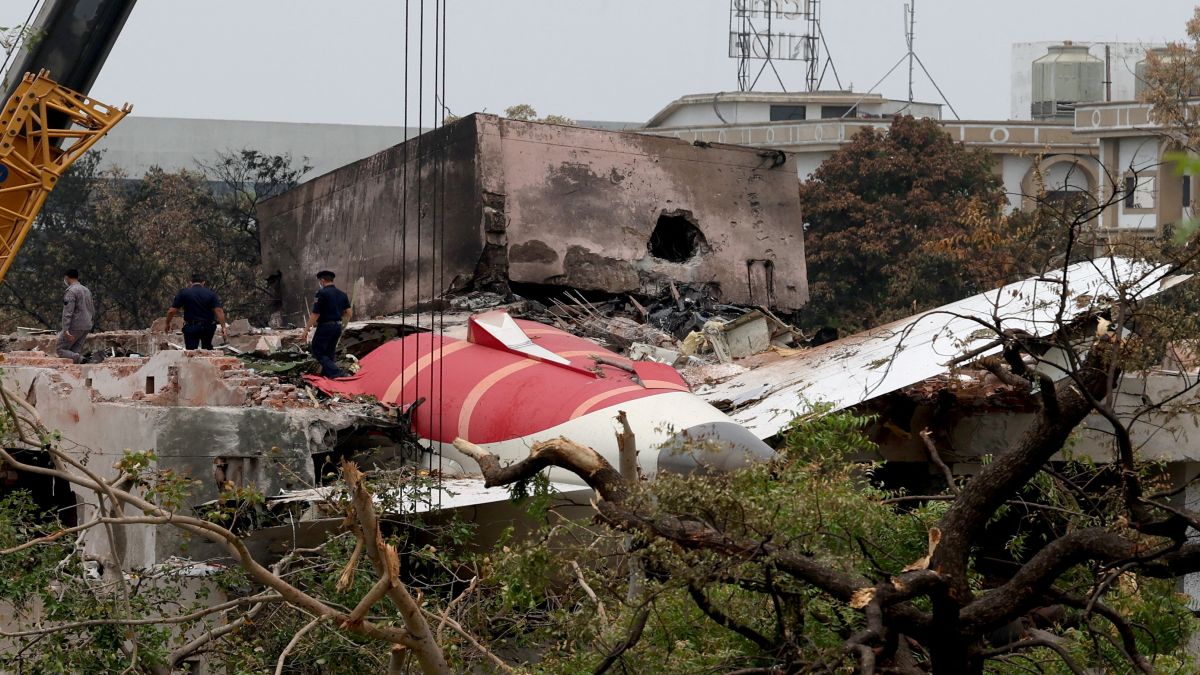On Thursday afternoon, an Air India passenger plane bound for London crashed shortly after takeoff from the Indian city of Ahmedabad. There were reportedly 242 people onboard, including two pilots and 10 cabin crew.
The most up-to-date reports indicate the death toll has surpassed 260, including people on the ground.
Miraculously, one passenger – British national Vishwashkumar Ramesh – survived the crash.
Thankfully, catastrophic plane crashes such as this are very rare. But seeing news of such a horrific event is traumatic, particularly for people who may have a fear of flying or are due to travel on a plane soon.
If you’re feeling anxious following this distressing news, it’s understandable. But here are some things worth considering when you’re thinking about the risk of plane travel.
Dangers of flying
One of the ways to make sense of risks, especially really small ones, is to put them into context.
Although there are various ways to do this, we can first look to figures that tell us the risk of dying in a plane crash per passenger who boards a plane. Arnold Barnett, a professor at the Massachusetts Institute of Technology, calculated that in 2018–22, this figure was one in 13.7 million. By any reckoning, this is an incredibly small risk.
And there’s a clear trend of air travel getting safer every decade. Barnett’s calculations suggest that between 2007 and 2017, the risk was one per 7.9 million.
Impact Shorts
More ShortsWe can also compare the risks of dying in a plane crash with those of dying in a car accident. Although estimates of motor vehicle fatalities vary depending on how you do the calculations and where you are in the world, flying has been estimated to be more than 100 times safer than driving.
Evolution has skewed our perception of risks
The risk of being involved in a plane crash is extremely small. But for a variety of reasons, we often perceive it to be greater than it is.
First, there are well-known limitations in how we intuitively estimate risk. Our responses to risk (and many other things) are often shaped far more by emotion and instinct than by logic.
As psychologist Daniel Kahneman explains in his book Thinking, Fast and Slow, much of our thinking about risk is driven by intuitive, automatic processes rather than careful reasoning.
Notably, our brains evolved to pay attention to threats that are striking or memorable. The risks we faced in primitive times were large, immediate and tangible threats to life. Conversely, the risks we face in the modern world are generally much smaller, less obvious, and play out over the longer term.
The brain that served us well in prehistoric times has essentially remained the same, but the world has completely changed. Therefore, our brains are susceptible to errors in thinking and mental shortcuts called cognitive biases that skew our perception of modern risks.
This can lead us to overestimate very small risks, such as plane crashes, while underestimating far more probable dangers, such as chronic diseases.
Why we overestimate the risks of flying
There are several drivers of our misperception of risks when it comes to flying specifically.
The fact events such as the Air India plane crash are so rare makes them all the more psychologically powerful when they do occur. And in today’s digital media landscape, the proliferation of dramatic footage of the crash itself, along with images of the aftermath, amplifies its emotional and visual impact.
The effect these vivid images have on our thinking around the risks of flying is called the availability heuristic. The more unusual and dramatic an event is, the more it stands out in our minds, and the more it skews our perception of its likelihood.
Another influence on the way we perceive risks relevant to flying is called dread risk, which is a psychological response we have to certain types of threats. We fear certain risks that feel more catastrophic or unfamiliar. It’s the same reason we may disproportionately fear terrorist attacks, when in reality they’re very uncommon.
Plane crashes usually involve a large number of deaths that occur at one time. And the thought of going down in a plane may feel more frightening than dying in other ways. All this taps into the emotions of fear, vulnerability and helplessness, and leads to an overweighting of the risks.
Another factor that contributes to our overestimation of flying risks is our lack of control when flying. When we’re passengers on a plane, we are in many ways completely dependent on others. Even though we know pilots are highly trained and commercial aviation is very safe, the lack of control we have as passengers triggers a deep sense of vulnerability.
This absence of control makes the situation feel riskier than it actually is, and often riskier than activities where the threat is far greater but there is an (often false) sense of control, such as driving a car.
In a nutshell
We have an evolutionary bias toward reacting more strongly to particular threats, especially when these events are dramatic, evoke dread and when we feel an absence of control.
Although events such as Air India crash affect us deeply, air travel is still arguably the safest method of transport. Understandably, this can get lost in the emotional aftermath of tragic plane crashes.
Hassan Vally, Associate Professor, Epidemiology, Deakin University
This article is republished from The Conversation under a Creative Commons license. Read the original article.


)

)
)
)
)
)
)
)
)



